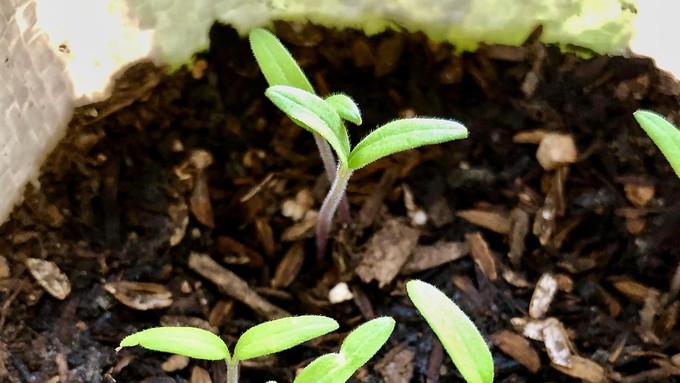
El Dorado County master gardeners offer free workshop

Tiny seeds quickly become tiny plants -- which become vegetables (in this case tomatoes) before you know it! Learn the best practices for seed-starting in Saturday's class. Kathy Morrison
Growing vegetables and flowers from seed is the most economical way to produce food and blooms as well as add new plant varieties to your garden. But how do you get started?
Learn tips from experts during “Starting Plants from Seed,” a free workshop offered by the UCCE master gardeners of El Dorado County.
Set for 9 a.m. Saturday, March 30, this three-hour class was originally scheduled for earlier in March but had to be postponed.
The class will cover the basics of seed starting while focusing on spring and summer favorites. Participants also get to keep their “homework” – some newly planted seeds.
Master gardeners Debi Valerga, Donna Hauser and Monte Kruger will lead the workshop, to be held at Cameron Park Community Center, Classroom B. The class is free, but space is limited; participants are urged to register in advance. Find the link here: https://surveys.ucanr.edu/survey.cfm?surveynumber=41927.
This class will include “a presentation on the selection and germination of seeds, starting media, containers, growing out, hardening off and transplanting seedlings,” say the master gardeners. “Following the presentation, participants will have an opportunity to plant seeds to take home. Seeds and containers are provided; bring clean gloves to participate.”
Cameron Park Community Center is located at 2502 Country Club Drive, Cameron Park.
Details and directions: https://mgeldorado.ucanr.edu/.
Comments
0 comments have been posted.Sacramento Digs Gardening to your inbox.
Food in My Back Yard Series
May 6: Maintain soil moisture with mulch for garden success
April 29: What's (already) wrong with my tomato plants?
April 22: Should you stock up on fertilizer? (Yes!)
April 15: Grow culinary herbs in containers
April 8: When to plant summer vegetables
April 1: Don't be fooled by these garden myths
March 25: Fertilizer tips: How to 'feed' your vegetables for healthy growth
March 18: Time to give vegetable seedlings some more space
March 11: Ways to win the fight against weeds
March 4: Potatoes from the garden
Feb. 25: Plant a fruit tree now -- for later
Feb. 18: How to squeeze more food into less space
Feb. 11: When to plant? Consider staggering your transplants
Feb. 4: Starting in seed starting
Sites We Like
Garden Checklist for week of May 11
Make the most of the lower temperatures early in the week. We’ll be back in the 80s by Thursday.
* Plant, plant, plant! It’s prime planting season in the Sacramento area. Time to set out those tomato transplants along with peppers and eggplants. Pinch off any flowers on new transplants to make them concentrate on establishing roots instead of setting premature fruit.
* Direct-seed melons, cucumbers, summer squash, corn, radishes, pumpkins and annual herbs such as basil.
* Harvest cabbage, lettuce, peas and green onions.
* In the flower garden, direct-seed sunflowers, cosmos, salvia, zinnias, marigolds, celosia and asters. (You also can transplant seedlings for many of the same flowers.)
* Plant dahlia tubers.
* Transplant petunias, marigolds and perennial flowers such as astilbe, columbine, coneflowers, coreopsis, dahlias, rudbeckia and verbena.
* Keep an eye out for slugs, snails, earwigs and aphids that want to dine on tender new growth.
* Feed summer bloomers with a balanced fertilizer.
* For continued bloom, cut off spent flowers on roses as well as other flowering plants.
* Add mulch to the garden to maintain moisture. Mulch also cuts down on weeds. But don’t let it mound around the stems or trunks of trees or shrubs. Leave about a 6-inch-to-1-foot circle to avoid crown rot or other problems.
* Remember to weed! Pull those nasties before they set seed.
* Water early in the day and keep seedlings evenly moist.